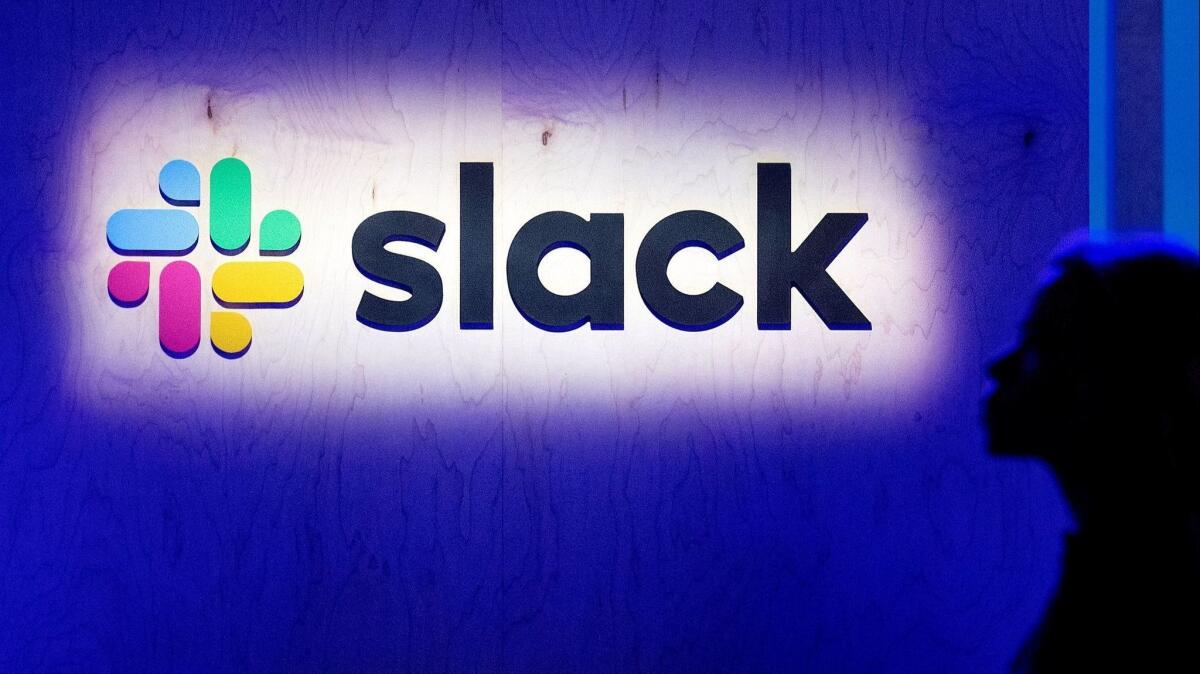Salesforce talks to buy Slack foreshadow showdown with Microsoft

- Share via
In the middle of last year, when Slack went public on Wall Street, cloud software company Salesforce ran a slide rule over the company to see whether it should attempt an acquisition.
Its view at the time, according to a person familiar with its thinking: Slack, the pioneer in a new form of workplace communication and collaboration software, was facing business challenges that made its shares look overpriced. If Salesforce was patient, there was likely to be a better moment to buy.
That time may finally have come. Salesforce is now in talks about buying Slack, setting up a showdown with Microsoft that could shape the way software is used by many of the world’s office workers.
For Marc Benioff, chief executive of Salesforce, the wait looks to have been worthwhile. His company’s shares have jumped 57% in the 17 months since Slack went public, even allowing for a 5% drop Wednesday on news of the talks. That has left him with a much stronger currency for a deal that is likely to be paid for largely in stock.
By contrast, shares in Slack had dropped nearly a quarter in the same period, before news of the potential deal caused them to pop.
Although Slack’s fortunes have flagged in a year when other cloud software stocks have been a hot commodity on Wall Street, its potential strategic value to Salesforce looks undiminished.
Created as a new form of channel-based chat service, Slack has evolved into a broader workplace tool. As more of a typical company’s activities are handled through software, the Slack service has become a starting point for an increasing range of activities, making it a window for tapping into other applications to do things such as launch a videoconference or track invoices.
In a sign of the central position it now holds in many workers’ lives, Slack says its users on average spend more than 10 hours a day connected to the service, and actively use it for more than 100 minutes.
However, Slack has lost ground this year to a similar service from Microsoft called Teams, thanks partly to Microsoft’s decision to include its service as a free add-on to the widely used Office suite of software tools. With the COVID-19 pandemic forcing workers to adopt new software to communicate, the number of people using Teams every day recently hit 115 million, up from only 20 million a year ago.
Slack, a more complex piece of software that has less immediate value as a pure communication tool for workers to stay in touch, has grown far more slowly. It does not disclose user numbers, but says 130,000 organizations now pay for its service, an increase of 30% over the last year.
Slack has also lost customers as smaller companies in particular have struggled this year. Stewart Butterfield, its chief executive, has argued that contracts with new customers in recent months have set the company in good stead for the longer term, but that the delay in recognizing revenue on cloud deals such as this means it will see a marked revenue slowdown before then.
For Benioff, meanwhile, an acquisition would cap a run of deals designed to broaden his company’s hold over daily working life, bringing him further into conflict with Microsoft.
Salesforce paid $6.5 billion for MuleSoft, a tool for integrating cloud applications and data, in 2018, and an additional $15.7 billion for Tableau, a data visualization service, the following year. But it lost a bidding war for LinkedIn to Microsoft, and Benioff later stretched Wall Street’s patience with an effort to buy Twitter. Three months ago he went out of his way to reassure investors, saying that valuations for software companies had reached such a high level that Salesforce was unlikely to be an acquirer.
Slack’s stock price underperformance might make it an exception, but Wall Street is still concerned. Worries that a deal would dilute Salesforce’s earnings per share wiped $12 billion from its market value Wednesday. But even a premium of 40% — roughly what Salesforce paid for its last two big acquisitions — would be justified if it produced the sort of lift that Salesforce got from its MuleSoft deal, said Derrick Wood, an analyst at Cowen.
The success of Teams has added to the urgency for Benioff to act. The Microsoft service has become an effective tool for channeling users to that company’s other applications — including its customer relationship management software, which competes directly with Salesforce’s core business.
Microsoft has succeeded by tightly integrating Teams with its broader cloud computing platform, tying workers more closely to its other software. That was one reason given by Slack for lodging an antitrust complaint with the EU earlier this year, claiming that it was being unfairly squeezed by Microsoft.
By contrast, Salesforce could look to use Slack as the “front end” for a more open set of cloud software tools, according to one person familiar with its thinking. It would connect with services such as Salesforce’s own CRM, while also continuing to stitch together widely used applications from other companies.
Benioff has already had some success with folding companies like this into the expanding Salesforce portfolio of software, along with the entrepreneurs behind them. Bret Taylor, one of the founders of Google Maps, joined Salesforce after the acquisition of his own cloud collaboration company, Quip, and has gone on to become its chief product officer. The former chief executives of Tableau and MuleSoft are also still with the company.
A key question now is whether Butterfield is ready to give up his own dream of building an independent rival to Microsoft and throw his lot in with Benioff.
Thanks to a special class of voting stock, Butterfield’s personal stake in Slack, currently valued at $1.6 billion, gives him nearly 22% of the votes, and he controls an additional 20% of the votes through a series of agreements with other shareholders. A further 26% voting stake is held by Accel, an early venture capital investor, adding to the concentration of control.
Butterfield’s last experience with selling a company he co-founded did not end well. Flickr, the photo-sharing site bought by Yahoo in 2005, has become a watchword in Silicon Valley for why entrepreneurs should resist selling out. Yahoo failed to capitalize on the groundbreaking service, and Butterfield has described his subsequent period at the internet portal as a low point in his working life.
With Microsoft running rampant and his latest company losing momentum, however, tying up with Salesforce may have become one of the best options for ensuring Slack remains a fixture of working life.
© The Financial Times Ltd. 2020. All rights reserved. FT and Financial Times are trademarks of the Financial Times Ltd. Not to be redistributed, copied or modified in any way.
More to Read
Inside the business of entertainment
The Wide Shot brings you news, analysis and insights on everything from streaming wars to production — and what it all means for the future.
You may occasionally receive promotional content from the Los Angeles Times.










